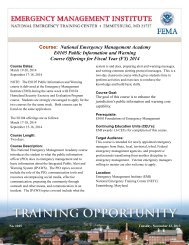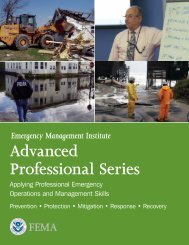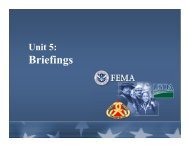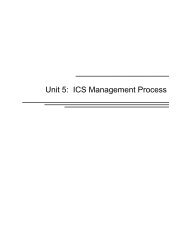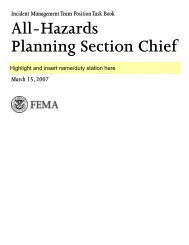Reputation and Federal Emergency Preparedness Agencies, 1948
Reputation and Federal Emergency Preparedness Agencies, 1948
Reputation and Federal Emergency Preparedness Agencies, 1948
You also want an ePaper? Increase the reach of your titles
YUMPU automatically turns print PDFs into web optimized ePapers that Google loves.
systems which are common to the full range of emergencies from small isolated events to the<br />
ultimate emergency—war.” 26 All hazards, however, was just one idea in the policy stream, <strong>and</strong> it<br />
competed with agency divisions that wanted FEMA to emphasize their own special missions,<br />
whether earthquakes, fires, or civil defense. Whereas fire, floods, <strong>and</strong> even oil spills could rely<br />
upon identifiable constituencies or stakeholders, terrorism <strong>and</strong> civil defense had significant<br />
support only in the bureaucracy <strong>and</strong> on congressional committees. These institutional supports<br />
might have withered away earlier if events had not propelled terrorism <strong>and</strong> nuclear war onto the<br />
national agenda.<br />
Terrorism first drew the attention of emergency preparedness planners during the 1972<br />
Munich Olympics; there, television cameras captured the images of hooded Palestinian terrorists<br />
who tried to leverage 11 Israeli hostages for the release of 200 Arab guerrillas imprisoned in<br />
Israel. News coverage followed from the moments when the terrorists first captured the Israeli<br />
athletes to the eventual murder of the hostages the next day. The grisly material <strong>and</strong> the almost<br />
continuous television coverage “turned viewers into voyeurs” <strong>and</strong> while commentators have<br />
remarked on how this prominent coverage changed the nature of television, it was also true that<br />
the television coverage changed how Americans perceived terrorism. 27<br />
Terrorism was the subject of several commissions <strong>and</strong> studies in the late 1970s, one of<br />
which was a 1978 National Governors Association report warning that “Little coordinated<br />
federal-state planning for terrorist consequence management has been undertaken” (National<br />
Governor's Association 1978, 107). The Association hoped that the newly established FEMA<br />
might “provide an important foundation for a comprehensive national emergency response<br />
system…,” <strong>and</strong> so along with a host of other responsibilities FEMA was given the task of<br />
coordinating terrorism consequence management though most of the work of responding to<br />
terrorist disasters would fall to state <strong>and</strong> local first responders. 28<br />
Terrorism might have gotten lost in the shuffle of reorganization if it were not for Ronald<br />
Reagan’s election to the presidency. Reagan took office with a clear idea that nuclear<br />
competition with the Soviets would be a centerpiece of his administration, <strong>and</strong> he made<br />
appointments accordingly. Reagan had been concerned with terrorism preparation <strong>and</strong> civil<br />
defense as governor of California. After witnessing the social unrest that defined the state in the<br />
1960s—riots <strong>and</strong> student protests—Reagan organized the California Specialized Training<br />
Institute, an emergency management counterterrorism training center in 1971. The director of the<br />
26 “FEMA History,” Accessed 11/12/03 at .<br />
27 Michael Thompson-Noel, “This Televisual Life,” New Statesman, July 26, 1996.<br />
28 In hearings on the plan to establish FEMA, members of Congress came to the conclusion that the agency would be responsible<br />
for the consequences of terrorism because such consequences resembled those of other kinds of incidents. One example of that<br />
conclusion is the following exchange:<br />
Mr. McIntyre: We think the consequences of terrorist acts can be quite similar to the consequences of major natural <strong>and</strong><br />
manmade disasters. For example, in both instances there will be serious disruptions of essential services or resources, or certainly<br />
could be, <strong>and</strong> I would emphasize the new Agency would be involved only with the consequences of terrorism <strong>and</strong> not with the<br />
incident itself. I want to underscore that point.<br />
Mr. Levitas: That is the point I am most concerned about.<br />
Mr. McIntyre: And so we felt that if you were going to have a broad-based agency to respond to emergency situations, that since<br />
the consequences of these terrorist acts could be expected to be similar to other emergencies, that this agency should be in a<br />
position to response.<br />
U.S. Congress, House Committee on Government Operations, Reorganization Plan No. 3 or 1978, p. 52. Also see Keith Bea,<br />
“FEMA’s Mission: Policy Directives of the <strong>Federal</strong> <strong>Emergency</strong> Management Agency,” CRS Report for Congress, February 13,<br />
2002, 14<br />
<strong>Reputation</strong> <strong>and</strong> <strong>Federal</strong> <strong>Emergency</strong> <strong>Preparedness</strong> <strong>Agencies</strong>, <strong>1948</strong>-2003 11



